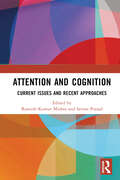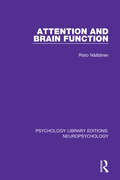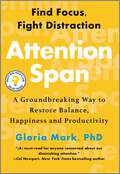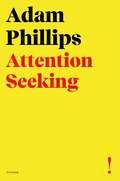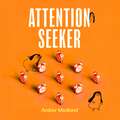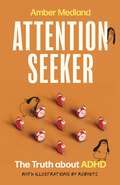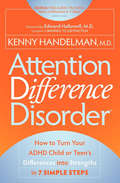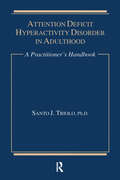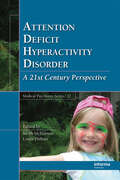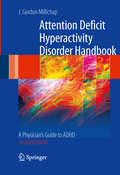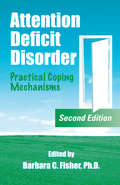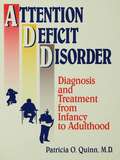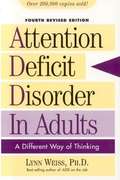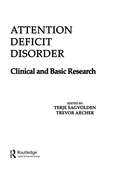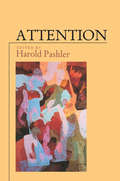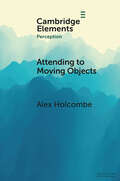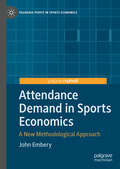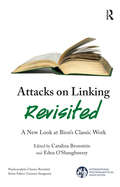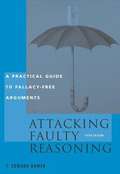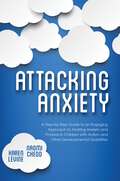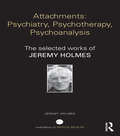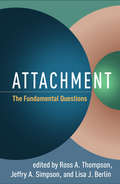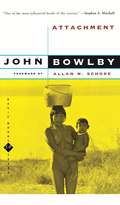- Table View
- List View
Attention and Cognition: Current Issues and Recent Approaches
by Ramesh Kumar MishraThis volume explores the psychology of attention and discusses the various cognitive processes that determine what we pay attention to.Much of our conscious moments are spent interacting with visual objects that we attend to and integrate into our consciousness. This book examines how we navigate this complex world of real and virtual objects and provides a comprehensive overview of the concept of attention and cognition. It focuses on themes related to different aspects of attention such as visual cognition and spatial orienting, selection history, priority map, the role of consciousness in attention research, and distractor suppression. It also discusses issues related to forming a comprehensive taxonomy of attention, emerging trends in attention research today and how they are being consolidated into the existing knowledge.Based on empirical research, this book will be of interest to students, researchers and teachers of cognitive psychology, cognitive science, cognitive and computational neuroscience, and computer sciences. It will also be useful to academicians, psychologists, neuroscientists, mental health professionals and counsellors.
Attention and Brain Function (Psychology Library Editions: Neuropsychology #8)
by Risto NäätänenOriginally published in 1992, this book presents original psychophysiological research based on computerized techniques of recording and evaluating event-related brain potentials. The application of multichannel magnetoencephalography greatly contributes to exact localization of corresponding neuronal generators responsible for attention. The book contains a bulk of information concerning data obtained by cognitive psychology in the area of study of attention. These results are closely linked with neurophysiological investigation of attention.
Attention Span: A Groundbreaking Way to Restore Balance, Happiness and Productivity
by Gloria Mark*A "Next Big Idea Club" Must-Read Book for January**AS HEARD ON ARMCHAIR EXPERT WITH DAX SHEPARD*Rediscover your ability to pay attention with this groundbreaking new approach from "the definitive expert on distraction and multitasking" (Cal Newport).We spend an average of just 47 seconds on any screen before shifting our attention. It takes 25 minutes to bring our attention back to a task after an interruption. And we interrupt ourselves more than we're interrupted by others.In Attention Span, psychologist Gloria Mark reveals these and more surprising results from her decades of research into how technology affects our attention. She shows how much of what we think we know is wrong, including insights such as: Why multitasking hurts rather than helps productivity How social media and modern entertainment amplify our short attention spans What drains our mental resources and how to refuel them The four types of attention that we experience every day and how to recognize themWhile the concept of &“flow&” has previously been considered the ideal state of focus, Dr. Mark offers a new framework to help explain how our brains function in the digital world: kinetic attention. This book reveals how we can take control, not only to find more success in our careers, but also to find health and wellness in our everyday lives.
Attention Seeking
by Adam PhillipsAttention Seeking is a short, fascinating introduction to the concept of attention from Britain’s leading psychoanalyst, author of Missing Out and On Kindness.Everything depends on what, if anything, we find interesting: on what we are encouraged and educated to find interesting, and what we find ourselves being interested in despite ourselves. There is our official curiosity and our unofficial curiosity (and psychoanalysis is a story about the relationship between the two).Based on three connected lectures by Adam Phillips, this compact book is a lucid and memorable introduction to the concept of our attention, spanning from interest to obsession, private desire to corporate commodity. What is attention, and why do we seek it? How does our culture moralize attention as a force in need of control? Phillips is one of our brightest and most unusual thinkers, uniquely capable of bringing our deepest impulses and instincts to light.
Attention Seeker: The Truth about ADHD
by Amber MedlandWhat does it mean to live in a world that punishes distraction, but profits from our attention?Why do so many ADHD individuals not feel at home at school or in the workplace? What does it really feel like to grow up, learn, work and exist in a world that wasn't built for your brain?Why are so many of us struggling with shame, burnout and - statistically speaking - a suspicious number of parking tickets?Attention Seeker is a groundbreaking, unfiltered exploration of ADHD - how it shapes lives across race, gender, and class, and why so many people are left undiagnosed and misunderstood.Drawing on research, lived experience and the realities of navigating ADHD in the UK today, Medland cuts through the myths and misinformation to uncover the truth. From education to employment, addiction to the criminal justice system, Attention Seeker reveals how ADHD intersects with power, privilege and oppression - and what needs to change.Ending with a bold anti-capitalist manifesto, Medland challenges everything we think we know about ADHD. The book asks: in a society obsessed with productivity and perfection, what can everyone learn from those who think differently?Attention Seeker is the first book of its kind. Equal parts eye-opening, urgent and authoritative, this is a call to rethink ADHD, not just as an individual diagnosis, but as a political issue.
Attention Seeker: The Truth about ADHD
by Amber MedlandWhat does it mean to live in a world that punishes distraction, but profits from our attention?Why do so many ADHD individuals not feel at home at school or in the workplace? What does it really feel like to grow up, learn, work and exist in a world that wasn't built for your brain?Why are so many of us struggling with shame, burnout and - statistically speaking - a suspicious number of parking tickets?Attention Seeker is a groundbreaking, unfiltered exploration of ADHD - how it shapes lives across race, gender, and class, and why so many people are left undiagnosed and misunderstood.Drawing on research, lived experience and the realities of navigating ADHD in the UK today, Medland cuts through the myths and misinformation to uncover the truth. From education to employment, addiction to the criminal justice system, Attention Seeker reveals how ADHD intersects with power, privilege and oppression - and what needs to change.Ending with a bold anti-capitalist manifesto, Medland challenges everything we think we know about ADHD. The book asks: in a society obsessed with productivity and perfection, what can everyone learn from those who think differently?Attention Seeker is the first book of its kind. Equal parts eye-opening, urgent and authoritative, this is a call to rethink ADHD, not just as an individual diagnosis, but as a political issue.
Attention Difference Disorder: How to Turn Your ADHD Child or Teen's Differences into Strengths in 7 Simple Steps
by Kenny HandelmanA psychiatrist with expertise in ADHD offers clear information and easy to follow strategies to help your ADHD child thrive. This book is designed to help parents address their child&’s Attention Deficit Disorder (ADD) or Attention Deficit Hyperactive Disorder (ADHD) in 7 simple steps. Written in clear, jargon-free prose, it synthesizes scientific and clinical research in a way that makes it accessible to parents of young children and teens. Dr. Handelman begins by dispelling many of the myths that often make parents of children with ADHD feel shame or guilt. Leaving the stigma and ignorance behind, Attention Difference Disorder offers a strength-based approach to a condition that has generally been treated negatively. The 7 simple steps to succeeding with ADHD include: 1) Education about the condition, 2) Ensuring a proper diagnosis, 3) Parenting Strategies, 4) Educational Strategies, 5) Medication Treatments, 6) Alternative Treatments and 7) Treatment Integration.
Attention Deficit: A Practitioner's Handbook
by Santo J. TrioloMost clinicians rely on only an interview to diagnose ADHD in adults. With the recent media "overkill" about ADHD, more and more patients have already read numerous articles and books about the topic making it even harder for practitioners to differentiate between symptoms due to ADHD and symptoms of a hypersensitive patient. As a result, the clinician should no longer rely on just an interview but a more sphoisticated and reliable method.Attention Deficit: A Practitioner's Handbook offers practical guidance to diagnose ADHD with special consideration to comorbid and differential diagnoses. This volume also challenges practitioners to move beyond current diagnostic criteria and presents arguments for standardized testing in addition to the traditional interview. Insightful commentaries on major points of current controversy in this area of study are also highlighted. Dr. Triolo, author of the Attention Deficit Scales for Adults (ADSA), also discusses theoretical perspectives of ADHD and bridges the gap between the research and clinical practice. A most practical volume that clinicians will appreciate in their library.
Attention Deficit Hyperactivity Disorder: Concepts, Controversies, New Directions (Medical Psychiatry Series)
by Keith McBurnett Linda PfiffnerCompiling the expertise and research of many of the most widely-cited opinion leaders in the field, this reference spans the etiology, assessment, and management of ADHD and covers all the essential data required to care for patients with this disorder including clinical definitions, psychosocial management approaches, medication dosing ranges, and
Attention Deficit Hyperactivity Disorder Handbook: A Physician's Guide to ADHD
by J. Gordon MillichapAn expanded, updated, and revised edition, the ADHD Handbook, second edition covers recent advances in causes and management of ADHD, and includes more than 400 scientific references to peer-reviewed articles. It provides answers to the numerous questions that surround ADHD, including how is it diagnosed? What causes ADHD? What are the risks of associated learning and behavior disorders, tics, seizures, and headaches? What treatments are available? What are the choices of medications and the risks of side effects? How can adverse effects be avoided? What are the alternatives to medication? Do children outgrow ADHD, and how long is treatment required? ADHD Handbook is written for neurologists, pediatricians, practicing physicians, residents, fellows and students of medicine, psychologists, educators, occupational and speech therapists, nurse practitioners and other healthcare providers. It also offers parents a readable, but uniquely well documented and objective account of ADHD symptoms, diagnosis, medications, alternative treatments, and management.
Attention Deficit Hyperactivity Disorder (in Adults and Children): The Latest Assessment and Treatment Strategies
by C. Keith Conners Juliet L. JettReaders can understand the Attention Deficit Hyperactivity Disorder (ADD/ADHD), learn how it is diagnosed, and find out the most effective treatment strategies.
Attention Deficit Hyperactivity Disorder
by Stephen M. Stahl Nancy Muntner Laurence MignonAs with Stahl's Essential Psychopharmacology, 3rd edition and The Prescriber's Guide, Attention Deficit Hyperactivity Disorder is a heavily illustrated title with a fun approach to theories. Stahl has been at the heart of significant advances in the treatment of ADHD in the past ten years, as new psychopharmacologic medications and cognitive and behavioral therapy techniques have been introduced into practice. The visual learner will find that these books make psychopharmacology concepts easy to master, while the non-visual learner will enjoy a shortened text version of complex psychopharmacology concepts. Novices to the series will find that the well-structured graphics and visual vocabulary can help build a vivid conception of complex pharmacologies. The complementary tables and algorithms provide clinical strategies and tips for drug dosaging, and the Suggested Reading section at the end of each book is an invaluable tool to guide the reader to more in-depth learning on particular concepts.
Attention Deficit Disorder: Practical Coping Mechanisms
by Lisa V. BlitzCompletely revised and updated, this Second Edition spans every issue related to ADD care and treatment. New chapters focus on emerging issues, the overlap of sleep disorders, how sleep disorders mimic ADD/ADHD and/or increase the symptoms, ADHD and sleep apnea, ADHD and restless legs or periodic limb movements in sleep, sleep in children, adolesce
Attention Deficit Disorder: Diagnosis And Treatment From Infancy To Adulthood (Basic Principles Into Practice Ser. #Vol. 13)
by Patricia O. QuinnPublished in 1996, Attention Deficit Disorder is a valuable contribution to the field of Psychiatry/Clinical Psychology.
Attention Deficit Disorder in Adults
by Lynn WeissADD in Adults enjoys steady sales year after year. Since its last revision in 1997, dozens of new treatments and philosophies about ADD and ADHD have met with storms of controversy and great media attention. As we've seen her do time and again, Lynn Weiss cuts through the noise and gets down to the point in a human, caring, and professional way. People turn to the Weiss library for a breath of fresh air on the ADD turmoil. Is it an allergy? A chemical imbalance? A genetic thing? Lynn's answer: "Who cares?" The new edition not only touches on and dispels the most recent clinical findings, it also emphasizes the bigger perspective, focusing on the humanitarian, economic, empowerment, and diversity issues facing all of us on the ADD continuum today.
Attention Deficit Disord Pod: Clinical And Basic Research (Attention And Performance Ser.)
by Trevor Archer Terje SagvoldenFirst published in 1988. This book grew out of an European Brain and Behaviour Society Workshop on Attention Deficit Disorder, Minimal Brain Dysfunction, Hyperkinetic Syndrome, and related dysfunctions held in Oslo, Norway in 1987. Virtually millions of children and adults suffer from problems variously described as attention deficit disorder (ADD), minimal brain dysfunction (MBD), hyperkinetic syndrome, or, most recently, attention- deficit hyperactivity disorder (ADHD). A main conclusion of the conference was that the attention problems of ADD children might be secondary to basic motor-control problems.
Attention (Studies in Cognition)
by Harold PashlerThis collection of essays, intended as a text for students, examines the different facets of research into attention. The book is divided into two sections: one deals with psychological research into such areas as visual search, dual-task interference and attentional bottleneck; the other deals with approaches to neural-network modelling and the effects of brain damage on attention.
Attending to Moving Objects (Elements in Perception)
by Alex HolcombeOur minds are severely limited in how much information they can extensively process, in spite of being massively parallel at the visual end. When people attempt to track moving objects, only a limited number can be tracked, which varies with display parameters. Associated experiments indicate that spatial selection and updating has higher capacity than selection and updating of features such as color and shape, and is mediated by processes specific to each cerebral hemisphere, such that each hemifield has its own spatial tracking limit. These spatial selection processes act as a bottleneck that gate subsequent processing. To improve our understanding of this bottleneck, future work should strive to avoid contamination of tracking tasks by high-level cognition. While we are far from fully understanding how attention keeps up with multiple moving objects, what we already know illuminates the architecture of visual processing and offers promising directions for new discoveries.
Attendance Demand in Sports Economics: A New Methodological Approach (Palgrave Pivots in Sports Economics)
by John EmberyThis book provides a new and unique perspective on ideas of demand within sports economics. It reviews the methodologies that underpin the current analysis of the demand for sporting events, highlights their limitations, and proposes ways in which they can be improved. By proposing a new framework that takes approaches from behavioural economics, socio-economics and open-systems methodology, a new perspective is proposed that deepens our understanding of the demand for sporting events and is presented as a research strategy that embraces qualitative and mixed methods. This book offers insight into a key economic idea through the lens of sports economics and the attendance of sporting events. It will be relevant to students and researchers interested in sports economics and the political economy of sport.
Attacks on Linking Revisited: A New Look at Bion's Classic Work (The International Psychoanalytical Association Psychoanalytic Classics Revisited)
by Catalina BronsteinThis book aims at providing further contributions inspired by Bion's paper Attacks on Linking (1959) by a distinguinshed group of scholars who have focused on different aspects of his propositions.Contributors: Christine Anzieu-Premmereur, Rachel B. Blass, Ronald Britton, Catalina Bronstein, Elias Mallet da Rocha Barros, Elizabeth Lima da Rocha Barros, Antonino Ferro, Jay Greenberg, Monica Horovitz, Clara Nemas, Edna O'Shaughnessy, Rudi Vermote
Attacking Anxiety: A Step-by-Step Guide to an Engaging Approach to Treating Anxiety and Phobias in Children with Autism and Other Developmental Disabilities
by Karen Levine Naomi CheddDrawing on the principles of Cognitive Behavioral Therapy (CBT), this book sets out a clear, enjoyable, step-by-step approach for addressing the sorts of anxieties, fears and phobias that are so common in children and teens with Autism Spectrum Disorders (ASD) and related challenges. Using this easy-to-follow model, parents and professionals will have the tools they need to help children and teens cope with and sometimes overcome anxieties caused by everyday occurrences. The book covers seven common scenarios, from fears of environmental sounds and visiting the doctor or dentist, to anxieties around transitions, changes to schedules and an intolerance for making mistakes. The model can be adapted to suit almost any anxiety or phobia and is ideal for use at home, at school and in clinical settings where it can be integrated into a variety of treatment approaches and styles. Designed to help parents of children with autism spectrum disorders and the teachers and therapists who work with them, this book is an excellent resource for successfully alleviating many of the anxieties and phobias that interfere with life enjoyment, not only for the child but for the entire family.
Attachments: The selected works of Jeremy Holmes (World Library of Mental Health)
by Jeremy HolmesFor three decades Jeremy Holmes has been a leading figure in psychodynamic psychiatry in the UK and across the world. He has played a central role in promoting the ideas of John Bowlby and in developing the clinical applications – psychiatric and psychotherapeutic – of Attachment Theory in working with adults. Drawing on both psychoanalytic and attachment ideas, Holmes has been able to encompass a truly biopsychosocial perspective. As a psychotherapist Holmes brings together psychodynamic, systemic and cognitive models, alert to vital differences, but also keenly sensitive to overlaps and parallels. This volume of selected papers brings together the astonishing range of Holmes' interests and contributions. The various sections in the book cover: An extended interview – covering Holmes’ career and philosophy as a psychodynamic psychiatrist 'Juvenilia' – sibling relationships, the psychology of nuclear weapons, and the psychodynamics of surgical intervention. Psychodynamic psychiatry: Integrative and Attachment-Informed A psychotherapy section in which he develops his model of psychotherapeutic change 'Heroes' – biographical pieces about the major influences including, John Bowlby, Michael Balint, David Malan, Jonathan Pedder and Charles Rycroft. 'Ephemera' – brief pieces covering such topics as frequency of psychodynamic sessions and fees. Attachments: Psychiatry, Psychotherapy, Psychoanalysis - The Selected Works of Jeremy Holmes will be essential and illuminating reading for practitioners and students of psychiatry and psychotherapy in all its guises.
Attachment: The Fundamental Questions
by Ross A. Thompson, Jeffry A. Simpson, Lisa J. BerlinThe ongoing growth of attachment research has given rise to new perspectives on classic theoretical questions as well as fruitful new debates. This unique book identifies nine central questions facing the field and invites leading authorities to address them in 46 succinct essays. Multiple perspectives are presented on what constitutes an attachment relationship, the best ways to measure attachment security, how internal working models operate, the importance of early attachment relationships for later behavior, challenges in cross-cultural research, how attachment-based interventions work, and more. The concluding chapter by the editors delineates points of convergence and divergence among the contributions and distills important implications for future theory and research.
Attachment: Second Edition (Attachment and Loss Series, Vol #1)
by John BowlbyThis first volume of John Bowlby's Attachment and Loss series examines the nature of the child's ties to the mother. <P><P>Beginning with a discussion of instinctive behavior, its causation, functioning, and ontogeny, Bowlby proceeds to a theoretical formulation of attachment behavior--how it develops, how it is maintained, what functions it fulfills. In the fifteen years since Attachment was first published, there have been major developments in both theoretical discussion and empirical research on attachment. The second edition, with two wholly new chapters and substantial revisions, incorporates these developments and assesses their importance to attachment theory.
